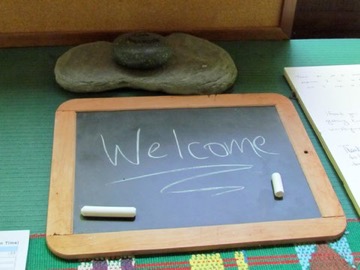
Director: Eric R. Dahlen, Ph.D.
admissions
Lab Welcomes Summer Steely
08/22/22 About
The Anger and Traffic Psychology Lab is happy to welcome our newest doctoral student: Summer Steely. Summer was admitted to the Counseling Psychology Doctoral Program at the University of Southern Mississippi and joined us in the Fall of 2022. She completed her bachelor's degree in Psychology at Wheaton College (IL). Summer obtained research experience at Georgia State University and the University of Wisconsin.
Summer discovered an interest in both research and clinical interventions while working in a residential treatment program for women. She is interested in working with forensic populations as part of her career, and her research interests include antisocial behavior, pathological personality traits, and aggression.
Congratulations to Summer on her admission to the doctoral program! We are looking forward to working with her.
Summer discovered an interest in both research and clinical interventions while working in a residential treatment program for women. She is interested in working with forensic populations as part of her career, and her research interests include antisocial behavior, pathological personality traits, and aggression.
Congratulations to Summer on her admission to the doctoral program! We are looking forward to working with her.
Lab Welcomes Nicole Kollmann and Terrina'Za Myles
05/19/21 About
The Anger and Traffic Psychology Lab in the School of Psychology at the University of Southern Mississippi is happy to welcome two new students who will be entering the Counseling Psychology Master’s Program in the fall. Terrina’Za Myles completed her undergraduate work at Alcorn State University and is interested in anger management, aggression, and college mental health. Nicole Kollmann completed her undergraduate work at the University of Wisconsin - Stevens Point. She is interested in dark personality traits and their application in correctional settings. Clearly, both have research interests that are a great fit for the work that we do.
Congratulations to Nicole and Terrina’Za on their admission to the MS program! We are looking forward to working with you both.
Congratulations to Nicole and Terrina’Za on their admission to the MS program! We are looking forward to working with you both.
Lab Welcomes Jacq Strowd
04/28/21 About

Prior to joining our MS program, Jacq graduated with a master’s degree in Criminal Justice from Northeastern University. She is interested in a career as a practicing psychologist in a setting that allows her to work with a diverse clientele, and she is particularly interested in both Veterans and offenders in the process of reentry. She also hopes to provide training and supervision to counseling professionals, so she has not ruled out obtaining an adjunct position at a university where she could be involved in practicum training.
Congratulations to Jacq on her admission to the doctoral program! We are excited to continue working with her.
Lab Welcomes Summer Boggs
04/08/20 About

Summer's research background includes work on self-esteem as a moderator of the relationship between perfectionism and demoralization. She is interested in risk factors for mental illness, including the identification of personality and individual difference variables that may contribute to an understanding relational aggression among emerging adults.
Congratulations to Summer on her admission to the doctoral program at the University of Southern Mississippi! We are looking forward to working with her.
Choosing a Thesis Topic
06/12/19 Mentoring

Even though a dissertation is more complicated than a thesis, most students find that selecting a dissertation topic is far easier than selecting a thesis topic because they know much more about research by that point. This post will focus on the doctoral student entering the program without a master’s degree and provide some tips on selecting a thesis topic.
Here are five things to keep in mind about selecting a topic for one’s master’s thesis:
- Students are encouraged to select a thesis topic consistent with the work we are doing in the lab. Occasionally, a new student may have a great idea for how to extend our work in a new direction; however, topics with little relevance to our work are unlikely to be approved.
- Once a broad potential topic area is identified (e.g., relational aggression among college students), narrowing it to identify the primary variables to be included and form tentative research questions will require the student to review the relevant literature. What are the current gaps in the literature on this topic? Where can one make a contribution by doing something different from what has been done before?
- Statistically, theses tend to be much less complex than dissertations. Some may only have 3-4 primary variables. One of the more common approaches we have been using in a number of recent thesis projects involves testing moderation or mediation. If we know, for example, that a variable we are interested in is positively related to relational aggression, we might ask whether another variable might help us understand the nature of that relationship (e.g., what might strengthen or weaken it, whether it depends on an intermediate variable).
- As important as the topic selected may seem, it is less important than being able to complete one’s thesis on time. Delays in doing so mean less time for completing a dissertation. Thus, topic selection must take feasibility into consideration. How large is the body of literature that will need to be reviewed? Can we recruit the participants we will need? Are psychometrically sound measures of the variables available?
- There is no such thing as a perfect study because we will never be able to include all potentially relevant variables and will always have constraints. A thesis that is completed on time, leads to a conference presentation and manuscript submitted for publication, and informs a student’s dissertation is about as close to perfection as we are going to get.
Lab Welcomes Amanda Dortch and Jacq Strowd
05/03/19 About

Congratulations to Jacq and Amanda on their admission to the master's program! We are looking forward to working with you.
Lab Welcomes Erica Van Overloop
03/24/19 About

Erica’s clinical work with children and families sparked an interest in trauma. She has some great ideas for how she might incorporate this interest in our work on relational aggression and victimization.
Congratulations to Erica on her admission to the doctoral program at the University of Southern Mississippi! We are looking forward to working with her.
Lab Welcomes A. J. Qureshi
07/16/18 About
The Anger and Traffic Psychology Lab is pleased to welcome Afzal “A. J.” Qureshi, a student who will be entering the Counseling Psychology Master’s Program at the University of Southern Mississippi this Fall. A. J. completed his B.A. in psychology at the University of Florida. He has obtained research experience in multiple faculty labs, and his interests in aggression and intimate relationships make him a good fit for the lab. He’s interested in an academic/research-oriented career and hopes to pursue a doctorate in Counseling Psychology.
Congratulations to A. J. on his admission to the master’s program! We are looking forward to working with you.
Congratulations to A. J. on his admission to the master’s program! We are looking forward to working with you.
Lab Welcomes Alison Poor
03/23/18 About

Alison is completing her B.S. in Psychology at Louisiana State University. During her undergraduate career, she was an ASPIRE Scholar and worked in Dr. Paul Frick's Developmental Psychopathology Lab. She is interested in juvenile corrections, working with mentally ill offenders, dark personalities, and relational aggression.
Congratulations to Alison on her admission to the doctoral program! We are looking forward to working with you.
Approach to Mentoring Graduate Students
01/27/18 Mentoring

My approach is collaborative in that I believe that the research process is most effective when a lab model is utilized. Graduate students receive support around their thesis and dissertation research while also providing support and assistance to others in the lab. Students who are making progress on their thesis/dissertation work often have the opportunity to participate in collaborative team projects.
My mentoring approach is developmental in that I recognize that every graduate student enters the program with a unique background, comfort level, and skill set around research. Some have already had considerable research experience working in a variety of faculty labs; others have not. Thus, it is important that research training goals take students' previous research experiences into account and build on student strengths.
Finally, my approach is individualized around students' career goals. For example, a doctoral student hoping to pursue an academic career will need a different set of experiences than a master's student aiming to pursue licensure as a professional counselor. Thus, an important part of mentoring involves recognizing that each student will have somewhat different needs.
At the Anger and Traffic Psychology Lab, we utilize a lab model where I meet regularly with all students throughout the Fall and Spring academic semesters. These lab meetings allow students to be involved in idea development, strategizing research design, planning statistical analyses, troubleshooting problems, and dissemination. Senior graduate students are expected to take on a peer mentoring role to assist more junior graduate students, and some graduate students (especially those seeking academic careers) will be encouraged to train and mentor undergraduate research assistants.
Student success is a top priority and is critical to lab productivity. I strive to set clear expectations and challenge students to develop their research competencies and critical thinking skills. Similarly, I challenge myself to provide meaningful support and timely feedback. The guiding principle is that we work better when we work together and support one another.
Personal Statement Advice
10/25/17 About

We are interested in learning about how your interests fit with ours and the sort of research you’d like to pursue during your graduate training. While providing a brief summary your prior research experience can be helpful, most of this information is likely to be reflected in your CV and letters of recommendation. Thus, we encourage you to use your answer to this question to demonstrate your fit with the lab.
Due to the competitive nature of the admissions process, the Counseling Psychology Doctoral Program asks applicants to identify more than one faculty member they would be interested in working with. This is what the part of the question asking about one’s flexibility with one’s 2nd choice faculty member refers to. Applicants who clearly demonstrate fit with their 2nd choice faculty member are likely to be evaluated more positively by that faculty member. In some cases, this can increase the chances of that applicant being interviewed and ultimately receiving an offer of admission.
To sum up, applicants interested in being considered by our lab are encouraged to describe how their research interests fit with ours. Those with diverse interests who would be open to working in another lab are also encouraged to address how their interests may fit with another faculty member.
Gaining Research Experience in Psychology as an Undergraduate
07/27/17 Mentoring

Believe it or not, working as an RA in a Psychology research lab can be valuable for a number of other reasons too. Here are just a few examples that come to mind:
- Some students do not discover their passion for research until they have the opportunity to be part of a research lab.
- Obtaining research experience allows students to develop the sort of portfolio of skills many employers are seeking (e.g., knowledge of the research process, interpersonal awareness, the ability to contribute to a team, effective problem solving, organization and time management).
- By working as an RA, a student provides a faculty member with the opportunity to get to know him or her in a meaningful way, and this often results in a more relevant letter of recommendation (i.e., the professor is able to address the student’s potential to succeed in the research-related aspects of graduate training and/or address many of the job-relevant skills noted above).
- Being part of a research lab often gives students a clearer understanding of the research process, and this can translate into improved performance in Psychology courses.
- Working as an RA in a lab that includes graduate students provides undergraduates with an accurate idea of what it is like to be a graduate student, what to expect from graduate training, and additional opportunities for mentoring.
- Students can sometimes opt to earn elective course credit by working as an RA in a lab.
Undergraduate students enrolled at the University of Southern Mississippi’s Hattiesburg campus can learn more about joining the lab.
Lab Welcomes Morgan Lowe
05/30/17 About
The Anger and Traffic Psychology Lab is pleased to welcome Morgan Lowe, a student who will be entering the Counseling Psychology Master’s Program at the University of Southern Mississippi this Fall. Morgan completed her B.S. in psychology at the University of Southern Mississippi, so she is already familiar with the area. Her interests in forensic psychology, relational aggression, and anger make her a great fit for the lab. Her future career plans include working with juvenile offenders, and she hopes to pursue a doctorate in Counseling Psychology.
Congratulations to Morgan on her admission to the master’s program! We are looking forward to working with you.
Congratulations to Morgan on her admission to the master’s program! We are looking forward to working with you.
Opportunities for Students to Present and Publish Their Work
09/25/17 About
One question that often comes up during doctoral admissions involves the availability of opportunities for students working in the Anger and Traffic Psychology Lab to publish and/or present during their time in the program. We encourage our doctoral students to present at professional conferences and to submit manuscripts based on their work for publication in peer-reviewed journals.
So while these opportunities are available, how many of our students actually take advantage of them? Not surprisingly, this depends on each student and his or her professional goals. Most of our doctoral students present work based on their master’s thesis and/or dissertation at professional conferences. Some go beyond this and present the results of collaborative research projects, literature reviews, or more clinically focused work as well. With more available conferences than any of us have the time or money to attend, these opportunities are plentiful. Similarly, most of our doctoral students will submit manuscripts based on their master’s thesis and dissertation for publication in peer-reviewed journals. Students seeking academic or other research-oriented careers will typically be involved in additional research projects that aim to produce publishable manuscripts.
Similar opportunities exist for master’s students; however, their condensed time frame is often a limiting factor. Because master’s students have a shorter program of study and do not have the same research requirements as doctoral students, it is less likely that they will complete independent research projects comparable to a thesis. For most master’s students, getting involved in collaborative research projects makes more sense and can still result in presentation and/or publication opportunities. For especially talented master’s students aiming to apply to doctoral programs, independent research projects can sometimes be arranged based on fit and available resources.
So while these opportunities are available, how many of our students actually take advantage of them? Not surprisingly, this depends on each student and his or her professional goals. Most of our doctoral students present work based on their master’s thesis and/or dissertation at professional conferences. Some go beyond this and present the results of collaborative research projects, literature reviews, or more clinically focused work as well. With more available conferences than any of us have the time or money to attend, these opportunities are plentiful. Similarly, most of our doctoral students will submit manuscripts based on their master’s thesis and dissertation for publication in peer-reviewed journals. Students seeking academic or other research-oriented careers will typically be involved in additional research projects that aim to produce publishable manuscripts.
Similar opportunities exist for master’s students; however, their condensed time frame is often a limiting factor. Because master’s students have a shorter program of study and do not have the same research requirements as doctoral students, it is less likely that they will complete independent research projects comparable to a thesis. For most master’s students, getting involved in collaborative research projects makes more sense and can still result in presentation and/or publication opportunities. For especially talented master’s students aiming to apply to doctoral programs, independent research projects can sometimes be arranged based on fit and available resources.
Welcoming Taylor Nocera-Bolton to the Doctoral Program
05/24/17 About
This announcement is long overdue, but we are pleased to welcome our newest doctoral student for the Fall 2017 term, Taylor Nocera-Bolton. Taylor has already been working with us during her time in the Counseling Psychology master’s program and had plans to pursue her doctorate. We were happy that she decided to apply to our program. As a doctoral student, Taylor plans to continue her research on cyber aggression.
Congratulations to Taylor on the admission!
Congratulations to Taylor on the admission!
Lab Welcomes Adijah Battle
07/01/16 About
The Anger and Traffic Psychology Lab is pleased to welcome Adijah Battle, a student who will be entering the Counseling Psychology Master's Program at the University of Southern Mississippi and joining us in the lab this fall. Adijah completed her B.S. in psychology at the University of North Carolina at Pembroke. Her interests in personality and psychopathology should make her a good fit for the lab.
Congratulations to Adijah on her admission to the master's program! We are looking forward to your arrival next month.
Congratulations to Adijah on her admission to the master's program! We are looking forward to your arrival next month.
Lab Welcomes Two New Doctoral Students
04/09/16 About

Savannah Merold will be graduating this spring with a B.S. in Psychology from the University of Southern Mississippi. At Southern Miss, Savannah worked as a research assistant in Dr. Sacco's Social Psychology Lab. She completed an independent project focusing on how social and emotional intelligence moderated the relationship between psychopathic personality traits and social perception.
Philip Stoner will be graduating this spring with a B.A. in Psychology and English from Mississippi University for Women. During his undergraduate career, Philip worked as a research assistant in the Clinical Studies Lab at Mississippi State University, where he obtained research experience in areas such as aggression, alcohol use, narcissism, and sleep.
Congratulations to Savannah and Philip on their admission to the doctoral program! We are looking forward to working with you both.
Lab Welcomes New Master's Students
07/30/15 About

Congratulations to Taylor and Michael on their admission to the master's program! We are looking forward to their arrival in Hattiesburg.
Lab Welcomes Skylar Hicks
05/06/15 About

Skylar completed her bachelor's degree in psychology at the University of New Orleans, where she worked in Dr. Monica Marsee's Youth Social and Emotional Development Lab. She has been working as a research associate in the Department of Psychiatry at the LSU Health Sciences Center. Her interest and experience in overt and relational aggression make her an excellent fit for the lab.
Congratulations to Skylar on her admission! We are looking forward to working with you in Hattiesburg.
Lab Welcomes Two New Doctoral Students
02/18/13 About
The Anger and Traffic Psychology Lab is pleased to welcome two new doctoral students for the Fall 2013 academic term.
Caitlin Clark is a master's student currently working in the lab who joined us in 2011 from Georgia College & State University. She plans to continue her research on aggression and hopes to broaden her focus beyond parenting-related variables. Niki Knight is completing her bachelor's degree at the University of Arkansas at Little Rock. Her interests make her a good fit for the lab.
Congratulations to Caitlin and Niki! We look forward to working with you.
Caitlin Clark is a master's student currently working in the lab who joined us in 2011 from Georgia College & State University. She plans to continue her research on aggression and hopes to broaden her focus beyond parenting-related variables. Niki Knight is completing her bachelor's degree at the University of Arkansas at Little Rock. Her interests make her a good fit for the lab.
Congratulations to Caitlin and Niki! We look forward to working with you.
